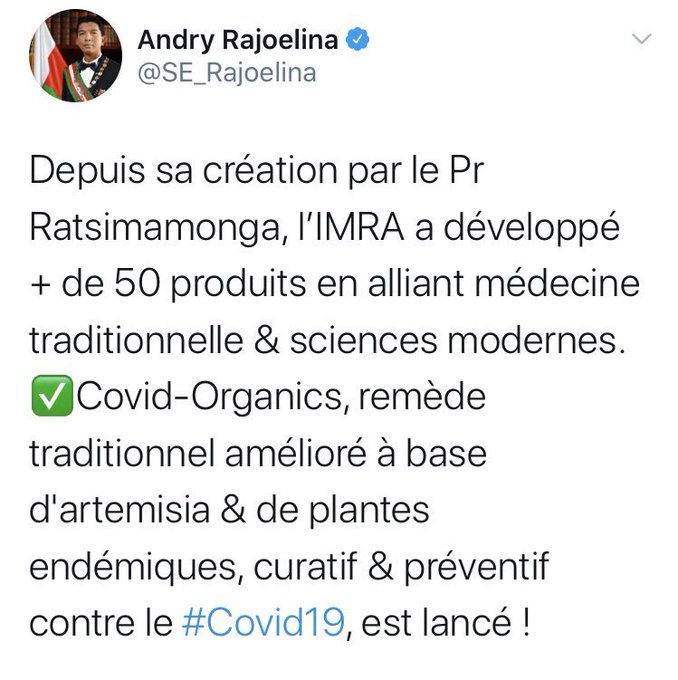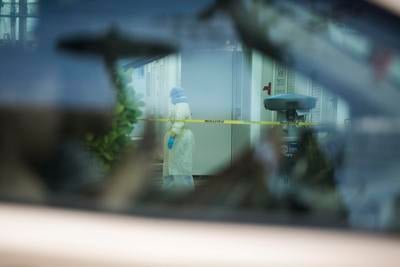Covid-19: Samy Tompon'Andraikitra Amin'izay Ataony
inona no tena zava-misy
Ny tenako dia efa nanolo-tena ny hilatsaka ho filoham-pirenena, tsy lany ary zero vigule ny vato azoko. Tsy manakana ahy andray ny andraikitro anefa izany satria latsapaka ato amiko ny hitondra ny soa ho an'ny Malagasy mpiray tanindrazana amiko.
Lavitra ahy ny anamaivana na anaratsy ny fikarohana vahaolana entina hiarovana, hanasitranana mihitsy aza an'ity valanaretina Coronavirus ity. Mamporisika hatrany anohy sy hanatsara izay efa hita, indrindra fa isika Malagasy manana ny akora rehetra mety ahomby amin'izany.
Inona anefa no zava-misy?
Ny famoahana fanafody eto amintsika dia mandalo an-tanantohatra maro.
Nivory ireo Akademisianina ara-pahasalamana (Académie de médecine) izay misy ireo dokotera mpitsabo, ny farmasianina, sy ireo mpahay momba ny fahasalamana.
Nantsoina tao ireo profesora 3 nametrahana ny andraikitra hitady ny fanafody momba ity Covid-19 ity.
Nanazava ireto prefesora ireto fa mbola tsy nanomboka ny fikarohana nataon'izy ireo, satria tsy neken'ny Comité d'éthique ny étude 3 naroso, tsy azo raisina na recevable akory satria mbola misy fombafomba sy fepetra na méthodologie arahina...
Nanontany ny Akademia hoe avy aiza ny nanaovana ny Covid-Organics raha toa mbola tsy nanomboka akory ny fikarohana, dia Protocole avy any amin'ny Maison de l'Artemisia io raha ny fanazavana naroso.
Tetsy ankilany dia nandefa mail tany amin'ny Maison de l'Artemisia ny tenako. Ataoko eto ambany ny resaka nifanaovana:
-------------------------
"Echange de mail avec Maison Artemisia
Bonjour,
Nous sommes un site d'information en ligne,
Nous avons vu votre communication avec le Président de
la République de Madagascar, est-ce que vous pouvez donner plus de
détails sur le contrat avec Madagascar. Qui a fourni les tisanes
Covid-Organics distribuées à la population malagasy actuellement, ou
du moins qui a fourni les bases du boisson.
Merci.
----------------------
Réponse
Bonsoir ,
Il n’y a aucun contrat entre nous et le Pdt malgache.
Nous avons fourni la même information à tous les gouvernements africains.
La plante est extrêmement connue, l’Artemisia annua est d’origine chinoise mais pousse aujourd’hui sur tous les continents vu ses vertus thérapeutiques.
Elle est non toxique et sans effets secondaires.
Votre pays a des milliers de producteurs d’Artemisia annua .
En résumé contre le Covid :
85% des chinois malades du Covid19 ont pris un cocktail de plante adapté à leur état clinique .
L’Artemisia annua a été donnée pour les cas modérés avec atteintes pulmonaires comme pendant l’épidémie de SARS pour écrêter la courbe du nombre de cas aigus .
La posologie est de 10g/litre par jour en décoction de 2 min jusqu’à fin des symptômes pulmonaires.
L’Artemisia annua possède 4 molécules actives contre le virus in vitro : lutéoline, kaempferol, quercétine et apigénine .
elle possède du Zinc qui booste le système immunitaire et des flavonoides qui modère la tempête cytoquinique.
Vous avez en PJ les documents de revues bibliographiques.
Nous restons à votre disposition pour plus de renseignements.
Très cordialement
Lucile Cornet-Vernet
Vice-présidente et fondatrice de la Maison de l’Artemisia"
------------------------------
Raha fintinina ny resak'ilay olona nandefa taratasy tamin'ny Filoham-pirenena nolazainy tamin'ny fahitalavitra iny fa i Madagasikara no hitondra ny fanafody ho an'ity aretina Covid-19 ity, dia nandefa mail izy hoe, tsy misy fifanarahana nataon'i Maison de l'Artemisia amin'ny fanjakana Malagasy fa taratasy mitovy no nalefany tamin'ny mpitondra maro aty Afrika.
Nilaza izy amin'io mail nalefany io fa ny Artemisia dia tsy misy pozina mahafaty, ary tsy misy fiatraikany ratsy na effet secondaire amin'ny vatan'olombelona.
Nanamafy izy fa 80% ny Sinoa nararin'ny Covid-19 tany Chine dia nihinana karazana zava-maniry samihafa arakaraky ny toe-batany avy.
Ny Artemisia annua kosa dia nomena ireo manana soritr'aretina maivamaivana izay nahakasika ny tratra sy ny fitaova-pisefoana, mitovy tamin'ny aretina SARS tany Chine, mba hifehezana ny fiakatry ny isan'ireo mety ho voa.
Nanazava izy fa mitondra hery fiarovana sy singa maromaro hampiakatra ny fiarovan-tenan'ny vatana ity Artemisia annua ity.
Ny 20 aprily 2020 dia nanao fanambaràna ny tao amin'ny Akademia:
"Amin'ny fikasana ny hizarana fanafody tambavy, dia manao izao fanambarana izao:
Io fanafody io dia tsy voafaritra mazava ny porofo siantifika nefa homena olona, indrindra fa ny zaza. Lahitokana ny aina ka adiditsika ny mitandro ny fahasalaman'ireo zanatsika.
Ankoatry izay, araka ny lalàna manankery dia ny Mpiasan'ny fahasalamana ary ny tobi-pahasalamana ihany no mizara fanafody".
Taorian'io fanambaràna io dia totoafo ireo tsindry, fa tsy niova tamin'ny heviny ny Akademian'ny fahasalamana.
Nampiantso ny Filoham-pirenena dia nisy solotena 3 nandeha tany.
Hatairana ny an'ny mpikambana maro ao amin'ny Akademia izay mbola tokony hivory androany 24 aprily, dia fanambarana an-gazety no hita nialoha lalana, amin'izay indray fanambarana amin'ny teny frantsay ranofotsiny, fa tsy toa ilay fanambaràna voalohany sady nisy tamin'ny teny malagasy no nisy teny frantsay.:
"Tsy fanafody ny Covid Organics fa tambavy nohatsaraina ary tsy misakana ny fampiasana azy amin’ny endriny tambavy ny Akademia, hoy ny fanambarana ary safidin’ny tsiraray ny handray azy manaja ny fatra voalaza, indrindra ho an’ny ankizy.
Ny Akademia kosa dia mamporisika ny ametrahana rafitra fanaraha-maso ireo izay nisotro ity Covid Organics ity".
Hita ihany koa fa samihafa ny fomba nanaovana frappe ilay taratasy, ary hita fa ny cachet dia voatsindry ambanin'ny soratra sy ny sonia. Ny anaran'ny mpanao sonia dia nalavaina Professeur ilay Pr izay efa nahazatra.
Etsy ankilany dia re koa fa mangataka hiaona amin'ny Institut Pasteur ny Ambassade de France satria tokony hiditra hianatra ny 4 mey izao ny sekoly fratsay, nefa tsy mazava aminy ny tena zava-misy.
Re ihany koa fa tsy faly ny OMS satria raha ny vola nomeny dia misy lamina maty paika amin'ny ady amin'ny Coronavirus, anisan'izany ny fihibohana sy fampitomboana ireo fitiliana, nefa eto amintsika dia nihena ny isan'ny fitiliana raha tokony ho amaroana, ary niroso aza amin'ny fiverenana tsikelikely amin'ny fiainana an-davan'andro.
Mbola tsy fantatra na nampiasaina tamin'ny fanamboarana ny Covid-Organics ny volan'ny OMS, fa raha ny fanambaràn'ny Filoham-pirenena tamin'ny fanombohana ny famoahana ny Covid-Organics dia volam-panjakana malagasy no hiantoka an'io.
Ny amaranako ny resaka, mamporisika hatrany ny fanjakana sy ny mpikaroka Malagasy hitady sy hampiray feo amin'ny fikarohana fanafody tena vita malagasy. Nefa kosa ataovy am-pahamarinana, mangarahara, tsy misy tsindry na hosoka sanatria.
Mangataka ny IMRA, izay tompon'antoka amin'ity Covid-Organics ity hamoaka ny marina rehetra, ianareo no tazonin'ny vahoaka malagasy ho tompon'andraikitra voalohany, fa tsy ny Bionexx, na Dzama, na Taf izay misahana ny famatsiana ny akora, fanaovana anaty tavoahangy ary fanaovana azy anaty sachet.
Tsy mbola asiana resaka aloha hatreto hoe ohatrinona ary ahoana no nahazoan'ireo ny tolotrasa, satria tsy midika fa mahazo manao izay tiana atao ny fitondrana amin'ny fitantanambolam-panjakana na dia misy aza ny fahamehana ara-pahasalamamana.
Ianareo OMS sy Institut Pasteur de Madagascar ary ny CCO kosa dia mila fanazavana matotra avy aminareo ny vahoaka malagasy.
Mila fanazava avy amin'ny minisitry ny fahasalama, ny Praiminisitra ary ny Filoham-pirenena mba ampitony ny ahiahy tsy hiavanana rehetra momba izao toe-javatra izay.
Ary mangataka ny mpikambana rehetra miaraka ao amin'ny Académie de médecine hamory ny mpanao gazety anazava sy anome ny tena marina amin'ny vahoaka Malagasy, ianareo no mpitsabo, ianareo no atokisana, ka aoka tsy ho very tanteraka amin'ny fisalasalana momba anareo ny Firenena.
Patrick Raharimanana
Patrick Raharimanana
Covid-19: Samy Tompon'Andraikitra Amin'izay Ataony










